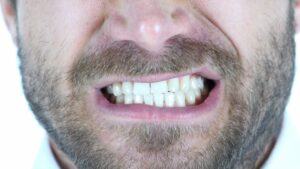Worn Out: Breaking Your Teeth Grinding Habit

Teeth grinding or clenching, sometimes called bruxism, is a dental condition common in children and usually happens while they are asleep or stressed.
This usually fades in adulthood when teeth fully develop, but in some cases, it persists even in adulthood. Long-term consequences of bruxism include jaw pain, tooth sensitivity, gum recession, and Temporomandibular Joint (TMJ) Disorders to name a few.
Early treatment for teeth grinding is usually considered to minimize the risk of long-term damage to teeth.
At Boley Braces, we offer a wide array of the latest orthodontic treatment options for various dental issues, including bruxism.
With Dr. Boley, a board-certified orthodontist in Cincinnati and Harrison, OH, you can rest assured that we will recommend the best treatment for your teeth grinding.
Stick around to learn more about bruxism, including bruxism exercises and when to seek medical attention.
What is Bruxism?
Grinding, gnashing or clenching your teeth when you’re awake or asleep is commonly referred to as bruxism.
Bruxism, or excessive grinding of the teeth, is categorized as either occurring at night (nocturnal bruxism) or when you’re awake (wakefulness or diurnal bruxism).
There’s no set cause for excessive teeth grinding, but some contributing factors can include:
- high-stress levels
- irregular sleep patterns
- misaligned teeth
- genetics
- lifestyle
- medication
Though more prevalent in children, some adults may experience bruxism. However, most of them may not be aware since it usually occurs while they’re asleep.
The reason why it’s essential to see a professional if you think you suffer from bruxism is because the act of excessive grinding can exert up to 250 pounds of force on your teeth while sleeping or awake, which can cause long-term problems.
Bruxism Exercises to Help With Teeth Grinding
If you’re concerned you might be grinding your teeth excessively, even at night, Dr. Boley would be more than happy to book an appointment with you.
There are some exercises for bruxism you can try, including but not limited to:
- Awareness Exercises: One way to prevent and manage bruxism is becoming more aware of the episodes that trigger teeth grinding. Some of the triggers include boredom, stress, and anger. Placing the tongue against the backs of your upper teeth is one exercise that can help you avoid teeth grinding after encountering any trigger.
- Neck and shoulder stretch: Bruxism is often associated with muscle tension in the neck and shoulders. Perform stretches to loosen these muscles, such as shoulder rolls and neck stretches, to help reduce overall muscle tightness.
- Stress-relieving exercises: Since stress is a common cause of bruxism, incorporating relaxation techniques into your daily routine can be helpful. Activities such as deep breathing, meditation, and yoga can help reduce stress levels and subsequently alleviate bruxism symptoms.
When to See a Professional
It is advisable to seek professional help if you are concerned about your bruxism’s effects on your sleep quality, oral health, and overall well-being.
Bruxism can be diagnosed by analyzing your medical history or conducting a physical exam.
For your medical history, your orthodontist might ask about any symptoms you’ve been showing and when they occur.
In a physical exam, your dentist will check the teeth for damage. They may also inspect the jaw and face for pain and tenderness.
For treatment, your dentist may issue you with mouth guards or other oral appliances that separate the teeth to prevent damage and reduce the risk of your teeth grinding together excessively.
Another dental treatment option for bruxism is teeth repair. Your orthodontist may use crowns and other procedures to repair worn-away teeth.
Dr. Broley will asses your situation and determine what the best course of treatment will be based on your situation.
Get Help With Grinding Teeth Today!
Teeth grinding can result in permanent damage if it’s not corrected early. If you’re dealing with or suspecting bruxism, it’s crucial to seek professional help as quickly as possible. At Boley Braces, we can help you find the perfect solution for your teeth grinding before things get worse. Contact us today and let our dedicated experts help you maintain your dental health!
Image Source: Stockbakery / Shutterstock
